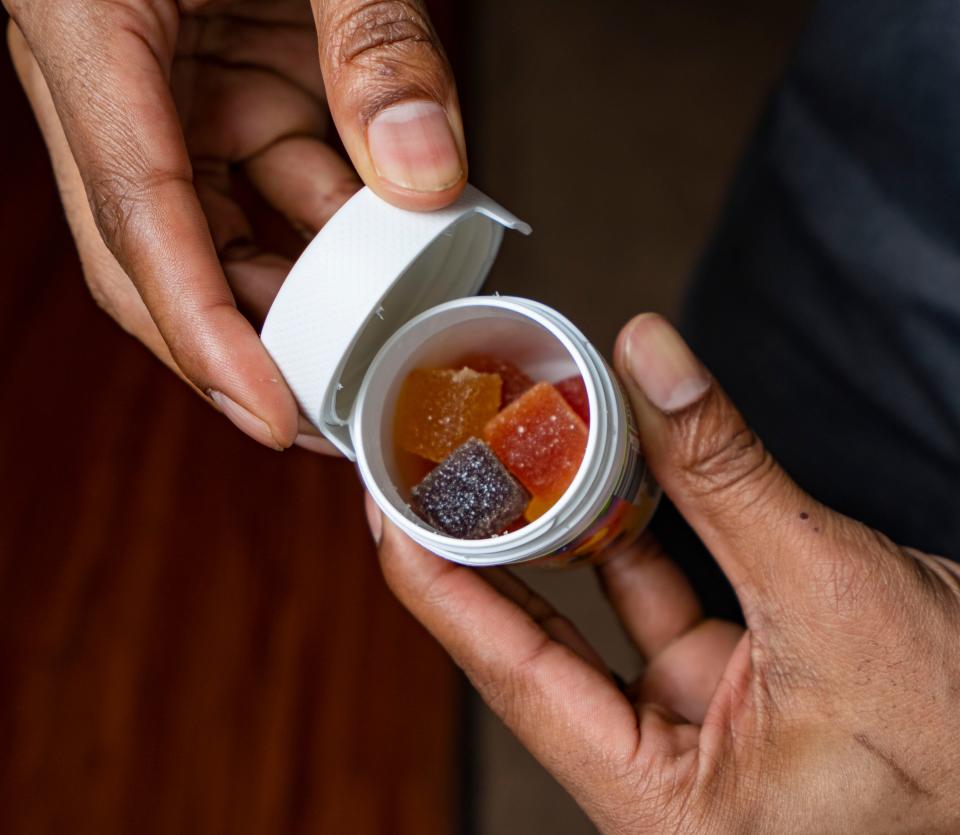'It's a real problem': Lawmakers debate banning delta-8, other hemp products in Wisconsin
This story is published as part of the series Highly Legal in partnership with The Examination, a nonprofit newsroom that investigates global health threats, and AL.com, PennLive and USA TODAY. Our team is continuing to report on new cannabis products, and we want to hear from you. Share your experience or questions with us here.
Delta-8 and other hemp products, with effects similar to marijuana, are being sold everywhere in Wisconsin and leading to a rise in poison center calls, with little oversight by regulators or apparent interest by lawmakers to act.
But that may be changing as the state's most powerful Republican raises alarms about the issue and a pair of Democratic lawmakers call for action.
The bipartisan interest follows an investigation by the Milwaukee Journal Sentinel, The Examination and AL.com, which found these chemical cousins to marijuana — known as delta-8, HHC, THCH and more — are causing a sharp rise in reports of children and adults getting sick, raising concern among doctors and public health officials.

Congress may be moving toward a change too. A House committee voted last week to ban most hemp-derived products.
Some people have reported positive results from the hemp products and are grateful they can buy them in Wisconsin. But even industry representatives say that more safety regulations are needed.
Wisconsin Assembly Speaker Robin Vos told the Journal Sentinel he wants to ban delta-8 and similar products.
"I think that's the wise move," Vos said. "But I think it's super unlikely with Democrats wanting to go in the opposite direction and legalize recreational marijuana, so we're kind of in a quandary."

Vos, R-Rochester, said he plans to take up the issue in the next legislative session, early next year. Republicans control the Legislature.
Earlier this year, he supported a strictly controlled plan to bring medical marijuana to Wisconsin. It failed after some members of his own party wouldn't support it. Vos said he is concerned delta-8 is a way to bring a similar substance into Wisconsin.
"It's just basically marijuana. It's just a different version of the same thing," he said. "I think it's a real problem that has to have a better answer than just throwing up our hands."
A pair of Democrats also raised concerns about the lack of oversight of hemp-derived products produced by the fast-growing industry, but they oppose banning delta-8 and other similar items.
Instead, they said they would like to see marijuana legalized and delta-8 and similar products regulated in the same way.
State Sen. Melissa Agard, who has proposed legalizing marijuana without success for years, said she has talked with hemp producers and processors across Wisconsin and they are looking for the government to step up with rules.
Agard, D-Madison, said the Legislature should have a comprehensive discussion about cannabis and regulate marijuana and hemp products.
Wisconsin has no statewide age limit for the new hemp products.
"I don't want my 14-year-old walking into a shop and buying delta-8, but now there's a real chance he could, depending on the flavor of the shop and the community that it is in," Agard said. "I can guarantee that the shop owners, people in the industry, the producers, they would say we need more guardrails."
State Sen. Chris Larson, D-Milwaukee, said he favors regulating hemp products, and including it under a framework to oversee marijuana in Wisconsin. Larson said there should be age limits and testing for all cannabis products.
"We should be making sure that there's a standard for purity and potency so that it is not the Wild West," Larson said.
He said making hemp products like delta-8 illegal would continue a pattern of punishing people for relatively minor offenses and clogging the criminal justice system, something that has happened with marijuana for decades.
"There is a temptation to say, 'Let's just ban all of it.' I think our police have better things to do. I don't think that is productive, and I don't think that it overall helps," he said.
The emergence of delta-8 and similar products can be traced to the 2018 Farm Bill, when Congress legalized the sale of hemp and products extracted from it. Hemp is a variety of the cannabis plant that has low levels of delta-9 THC, the psychoactive compound that gets people high.
Through processing, manufacturers have found ways to extract highly potent compounds from hemp. As of last year, the fledgling industry had grown to nearly $3 billion in annual sales, fueled by online and in-person purchases.
Researchers who have tested the products report finding traces of heavy metals and other dangerous substances likely left behind by the extraction process. They also report widely variable concentration levels. An official at the FDA called the emergence of delta-8 and other hemp products a "big human guinea pig experiment."
Unlike other states, Wisconsin has done nothing to regulate the products.
As the wildcat industry has flourished, Wood County in north central Wisconsin, population 74,000, was the first local government in the state to act, setting an age limit of 21 two years ago.
Because there is no oversight, it is impossible to say how big the hemp industry is in Wisconsin. Agard said she has toured several reputable facilities. And while those businesses are calling for regulation, she wants lawmakers to understand how any action could affect them.
"If and when the Legislature dips their toe into this conversation, they need to realize that there is a real industry out there and there are people benefiting from these shops and families that are getting good paying jobs because of it," she said.
John Diedrich is an investigative reporter for the Milwaukee Journal Sentinel. He can be reached at [email protected].
This article originally appeared on Milwaukee Journal Sentinel: Wisconsin lawmakers debate banning delta-8, other hemp products
